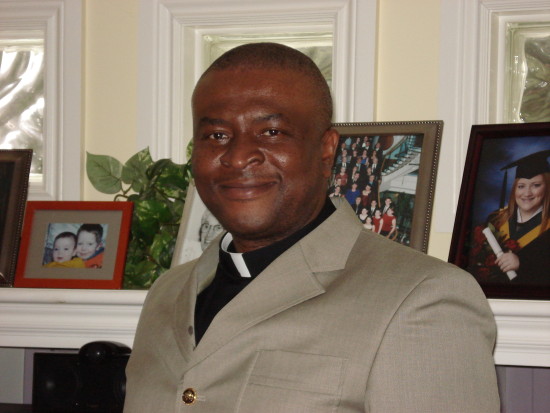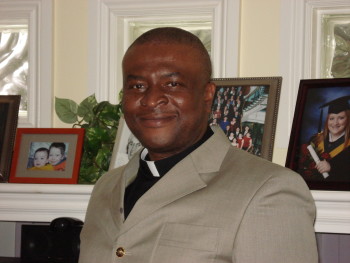
Could you tell me about your childhood? Where were you born? Is there anything about your childhood that stands out for you?
I was born in Umuoji, Idemili North Local Government Area, Anambra State, Nigeria. There’s nothing that stands out about my childhood except that it was full of joy and happiness. I had an exceptional fulfilling childhood. I will describe my childhood with three words: loving, positive and disciplined.
Loving: I grew up in a loving, respectful and faithful family. My parents are very loving and caring. They sacrificed a lot for us. They were ready to starve in order that we may eat. Their love for us is written in everything they did for us even to our adulthood. This love and care from my parents were transferred to all of us in the family including others who are not my siblings. Love and care became infectious among everyone in our house and this I will say laid the foundation of who we became and of our vocations.
Positive: The protection I received during my childhood created the sense of trust and freedom that no matter what it shall be well. There was never any need to panic or become despondent,’everything will be alright’ was a constant byline that we all came to believe, and things surely always got alright. My parents brought us up in that way and the people that I encountered during my childhood confirmed it.
Discipline: My parents were both teachers and practising Christians and as such a great disciplinarians. In fact, many parents brought their children to my parents to help them inculcate discipline into their children. Secondly, I am the first born among my siblings and as such should be a role model for my brothers and sisters and my parents made sure I became saddled with such responsibilities early in my growing up days. The constant reminder that that ‘there is no room for mistakes’ automatically and unconsciously instills discipline and responsibility in you. This discipline was also translated to fear of God and being law abiding. My parents were good and faithful Christians (Catholics). No wonder the love to become a priest started as early as 7 years of age.
Was there any person or persons that influenced your childhood the most?
The most significant other in my childhood were my parents. Other people that influenced my childhood most were my parish priest, Father Tobby (an Irish priest) and Father Felix (the first priest in my town Umuoji) both are dead now.
What is your educational background?
My educational background crosses many branches, from philosophy, to theology, education and counselling.
Could you describe your job as a parish priest at St. Leonard, St. Brigid and St. John the Evangelist Churches?
I am a pastor, a counselor and a shepherd for the people here and I find the job fulfilling, loving and educating. The various parishes that I have had the privilege of pastoring thus far has made me to understand and appreciate people more and to develop a deeper spiritual insights in my dealings with everyone. It has surely provided me with priceless experiences and fulfillment.
You are one of the few priests from continental Africa in charge of a parish in Canada. What has the experience been like? Do you get the same level of respect and recognition as white clergy?
For the most part people are very accepting and considerate. They recognized that there are differences in our cultural background and they fully expect that I might have a slightly different assent. But in the current situation where there is a short supply of Canadian born priest, I sense they are extremely grateful for my presence.
It has been observed that in Canada as well as the US and Europe, more and more priests from Africa are taking charge of parishes, most of which are made up of white church members. Some refer to this as “the reverse missionary journey” alluding to the fact that historically, white missionaries had journeyed to the deepest parts of Africa to bring Christianity to the people. Hitherto Africans had been followers of traditional religions, “worshipers of false gods” as described by some historians. How do you explain this phenomenon?
I would first of all want to correct the notion that Africans were worshipers of false gods. Traditional religion is not worship of false gods. They worshiped the Supreme God though they were not Christians because they had not heard of Jesus Christ. The early missionaries misunderstood the situation and therefore misinterpreted the practice; thereby terming it devilish practice. It was Christianity that the white missionaries introduced to them and not the knowledge of the Supreme God.
Coming to the reverse missionary journey as you called it, every baptized Christian is a missionary whether white or black. Whites were missionaries to the Africans and now the Africans are missionaries to the whites. Missionary work is symbiotic (give and take). It is the Lord’s work, a vast vine yard where the labourer goes wherever the master sends him/her and on whatever area of the vineyard that there is need. In the 19th and early 20th centuries, it was Africa. Then from late 20th to 21st century it is Europe and North America.
The current Pope Francis is seen by many Catholics and non-Catholics alike as progressive and forward looking. But by and large, the Catholic Church is perceived as very conservative and not changing with the times. What is your view of the pontiff and what should he do to align the church to today’s realities?
The premise of the question is misinformed. Throughout history the church has been at the forefront of education, establishing many universities and centers of learning. For example, Father George Lemaitre, a Belgian priest, astronomer and professor of Physics at the University of Leuven. He proposed the “Big Bang” theory, the expansion of the Universe, before Edwin Hubble. Also, Roman Catholic Church, Ottawa, established University of Ottawa in 1848 as the college of Bytown by the Oblates Fathers. Father Joseph Tabaret, OMS, was the three time rector for a total of 30 years. He is regarded as builder of the university.
The teaching of the church is based on 2000 years of its development and doctrine, consistent on the apostolic tradition. This rootedness in the apostolic tradition will not damage in its essence but how it applies to everyday realities is the question. Pope Francis in Citizen Newspaper article of May 19, 2015, urges bishops to change emphasis and focus on people. The Holy Father is not changing the teaching but asking the bishops to realign the emphasis and focus. Pope Francis has begun by setting a tone to all our catholic messages that leads with love, after all God is love. The Pope has awakened the public imagination and created a very strong interest in the return to the church. We need to ensure that the same message of love that he is giving on the global stage is present right here in Enniskery and Manotick.
However, the church does not “align” itself with passing issues and with regional and cultural questions. Rather the church obliges itself with Jesus Christ as revealed to us in the Sacred Scriptures and as interpreted within the Apostolic Tradition.
Speaking of the Pope, all the people elected to this position since the early days of the church have been white. And yet Catholicism has shown tremendous growth in Africa in the last decade, while there has been a significant drop in numbers in the western world. In light of this, do you foresee a black Pope in your lifetime?
Yes absolutely! But we should understand that the Church belongs to Christ and the Holy Spirit is the Soul of the Church and directs the affairs of the Church. The Spirit blows where it wills so it is not necessary for us to worry ourselves about where the pope will come from. If on one hand a pope comes from Africa it is for the good of the Church; if, on the other hand, he is from another continent it is also for the good of the Church.
Celibacy for priests, ordination of women, and same-sex marriages are issues that continue to challenge the church. Other Christian denominations have accepted these modern day realities but not the Catholic Church. What are your views on these topics and do you see the church changing its stance on these controversial issues in the near future?
See also answer to no.7. I wish to state also that these three things are not of the same order. Marriage certainly will not change because it is rooted in our natural law and scriptures. See “Declaration on Marriage”. The Declaration on Marriage is a unique document written by the CCCB together with the Evangelical Fellowship of Canada. Ordination of women has to do with doctrinal, theological and historical reasons and I don’t see the church changing it in the near future. And celibacy is a question of discipline and not of doctrine. Celibacy has been around for over 400 years now since 4th century.
The Catholic Church has her own principles and these principles have been guiding her for centuries. I do not think it is proper for her to be floating and following every wind of change. If at all a change is needed, the situation has to be studied thoroughly before coming to a conclusion. You cannot because few people are making their voice to be heard and also exaggerating the situation, or those other denominations that have done this or that for us conclude that this or that is necessary.
Looking at the Black population in Canada, what do you see as our greatest challenge and how do we resolve it? What are our strengths?
In general in Canada we are doing very well in economics, political and religious segments but this is not consistent in all ethnic background. The greatest challenge for the black population here is economics. For instance, I have had personal experiences with the issue of professional accreditation in Canada. A certified engineer from Cameroun can take as long as ten years to get his professional accreditation here in Canada. Efforts to shorten this length of time and to put in place other support program that will rapidly allow black immigrants to find gainful employment should be of highest priority.
Finally, do you have a message for readers of Black Ottawa Scene?
It’s wonderful to have a vehicle to be able to communicate to my fellow blacks in the Ottawa area. We have made much progress over the years in many facets of the community – economic, political or religious. In order to continue our progress we can never forget the importance of caring for each other, being a good citizen of our city and of our country and being God fearing people. My special blessing to you all!


We’re very happy to see you, even in cyberspace. 15 years since you joined us in matrimony. Our best wishes, Carol & Arthur MacDonald